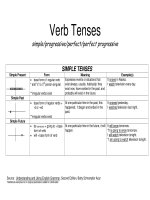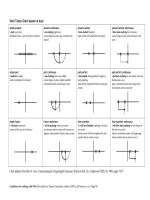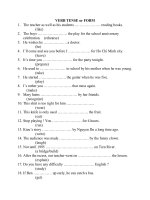ESL verb tense chart
Bạn đang xem bản rút gọn của tài liệu. Xem và tải ngay bản đầy đủ của tài liệu tại đây (80.28 KB, 4 trang )
Verb Tenses
simple/progressive/perfect/perfect progressive
SIMPLE TENSES
Simple Present
Form
base form of regular verb
* add “s” to 3rd person singular
xxxxxxxxxx
**irregular verbs exist
Meaning
Expresses events or situations that
exist always, usually, habitually; they
exist now, have existed in the past, and
probably will exist in the future.
Example(s)
It snows in Alaska.
I watch television every day.
At one particular time in the past, this
happened. It began and ended in the
past.
It snowed yesterday.
I watched television last night.
Simple Past
base form of regular verbs +
-d or –ed
x
**irregular verbs exist
Simple Future
x
be (am/is/are) + going to + base
form of verb
will + base form of verb
At one particular time in the future, it will It will snow tomorrow.
happen.
*It is going to snow tomorrow.
I will watch television tonight.
*I am going to watch television tonight.
Source: Understanding and Using English Grammar, Second Edition, Betty Schrampfer Azar
*Additional examples not in original publication added for clarification
PROGRESSIVE TENSES
Present
Progressive
10:00
x
11:00
x
Form
be (am/is/are) +
base form of
verb + -ing
Meaning
He went to sleep at 10:00 tonight. It is now 11:00 and
he is still asleep. His sleep began in the past, is in
progress at the present time, and probably will continue.
Example(s)
He is sleeping right now.
*I am sleeping right now.
You are sleeping right now.
We are sleeping right now.
They are sleeping right now.
Past Progressive
10:00
x
11:00
x
was/were +
base form of
verb + -ing
He went to sleep at 10:00 tonight. I arrived at 11:00.
He was still asleep. His sleep began before and was in
progress at a particular time in the past. It probably
continued.
He was sleeping when I arrived.
*I was sleeping when…
You were sleeping when…
We were sleeping when…
They were sleeping when…
Future Progressive
10:00
x
11:00
x
will be + base He will go to sleep at 10:00 tomorrow night. I will arrive
form of verb + at 11:00. The action of sleeping will begin before I
arrive and it will be in progress at a particular time in the
-ing
future. Probably his sleep will continue.
He will be sleeping when I arrive.
The progressive tenses give the idea that an action is in progress during a particular time. The tenses say that an action begins before, is in progress
during, and continues after another time or action.
Source: Understanding and Using English Grammar, Second Edition, Betty Schrampfer Azar
*Additional examples not in original publication added for clarification
PERFECT TENSES
Present Perfect
eat
x
now
x
Form
Meaning
I finished eating sometime before
have/has +
past participle now. The exact time is not
important.
(time?)
Example(s)
I have already eaten.
*You have…eaten.
He has… eaten.
They have…eaten.
We have…eaten.
Past Perfect
had + past
participle
eat arrive
x
x
First I finished eating. Later they
arrived. My eating was completely
finished before another time in the
past.
I had already eaten when they arrived.
Future Perfect
eat arrive
x
x
First I will finish eating. Later they
will have +
past participle will arrive. My eating will be
completely finished before another
time in the future.
I will have already eaten when they arrive.
The perfect tenses give the idea that one thing happens before another time or event.
Source: Understanding and Using English Grammar, Second Edition, Betty Schrampfer Azar
*Additional examples not in original publication added for clarification
PRESENT PERFECT PROGRESSIVE TENSES
Present Perfect
Progressive
x
Form
Meaning
Example(s)
*have/has been
+ base form of
verb + -ing
Event in progress: studying.
When? Before now, up to now.
How long? For two hours.
I have been studying for two hours.
*had been +
base form of
verb + -ing
Event in progress: studying.
When? Before another event in
the past.
How long? For two hours.
I had been studying for two hours before my friend came.
*will have been +
base form of
verb + -ing
Event in progress: studying.
When? Before another event in
the future.
How long? For two hours.
I will have been studying for two hours by the time you
arrive.
x
2 hrs.
You have been studying
He has been studying
They have been studying
We have been studying
Past Perfect
Progressive
x
x
2 hrs.
Future Perfect
Progressive
x
x
2 hrs.
The present perfect progressive tenses give the idea that one event is in progress immediately before, up to, until another time or event. The tenses are
used to express the duration of the first event.
Source: Understanding and Using English Grammar, Second Edition, Betty Schrampfer Azar
*Additional examples not in original publication added for clarification









